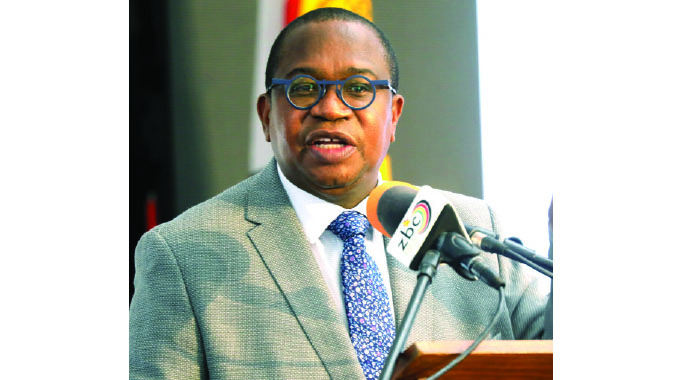2023 Budget should address high taxation issues: Industry

Sikhulekelani Moyo, Business Reporter
BUSINESS leaders and captains of industry have said the 2023 National Budget should address issues of high taxation and outline investor friendly business financing models to curb inflation and maintain stable exchange rates including widening tax bands to cushion workers.
Finance and Economic Development Minister Professor Mthuli Ncube is today expected to present the 2023 National Budget statement at the New Parliament Building in Mt Hampden in Harare.
Treasury recently outlined key principles guiding the crafting of the national budget in line with diverse stakeholder policy input gathered during the recent nationwide public consultative meetings.
Zimbabwe has this year managed to maintain macro-economic stability amid domestic and external headwinds. The country is now expected to close the year with revised Gross Domestic Product (GDP) growth of 4,6 percent from the initial 5,5 percent.
In July, Cabinet adopted the 2023 National Budget Strategy Paper which is issued annually to guide the forthcoming budget consultations and other processes for the next fiscal year.
In a pre-2023 budget briefing, Prof Ncube indicated that the budget statement will largely focus on “deepening economic transformation”.
He stated that the economy is growing, albeit at a slower rate compared to 2021, on account of global disturbances and other adverse domestic factors.
The pre-budget ideals take into account domestic and global economic developments and outlook, 2022 budget performance and projected outlook for next year, as well as domestic resource mobilisation measures.
While the country’s economy remains on steady growth, Treasury has revised downwards projected GDP estimates from the initial 5,5 percent to 4,6 percent, reflecting the impact of the external global environment.
Through Vision 2030, the Government also wants to achieve an upper middle-income economy with per capita income approaching US$3 500. In an interview, Zimbabwe National Chamber of Commerce (ZNCC) Matabeleland chairperson Mr Mackenzie Dongo said it is critical for the budget to tackle the multiple taxing regime.
“As business, we expect taxation relief particularly on the four percent Intermediated Money Transfer Tax (IMTT) on nostro transactions. We expect the minister to review that downwards to at least two percent because the cost is actually a huge burden to business,” he said.
“In addition, we expect the minister to make the IMTT both on Zimbabwe dollar and United States dollar transactions to be tax deductible for corporate tax purposes.”
The market generally holds the view that a four percent tax is too high and may be detrimental to the flow of foreign currency to the formal system.
Mr Dongo said for the benefit of workers they expect that the Pay as You Earn tax bands to be widened so that employees can be cushioned against the escalating cost of living.
“We expect continued micro economics that stabilise inflation, stability and availability of local currency. We also expect policies that support the agricultural sector particularly, more support of the healthcare sector, formalisation of the informal sector and supporting the energy sector for production stability,” he said.
The Confederation of Zimbabwe Industries (CZI) in its budget submission said it expects the 2023 National Budget to place priority on ensuring businesses access finance for retooling and enhancing value chains amongst the identified sectors.
“The confederation said Zimbabwe received SDR 677,4 million (US$958 million equivalent) from the International Monetary Fund (IMF) last year.
“The 2022 National Budget highlighted that there was US$30 million that would be allocated towards the productive sector value chains while a retooling revolving fund for new equipment and replacement for value chains was to be created,” said CZI.
“CZI believes that these funds have not yet been made available for industry to tap in. It is hoped that the 2023 National Budget will place priority on ensuring that finance measures, including SDR resources, are made available.”

Confederation of Zimbabwe Industries (CZI)
An economist, Mr George Nhepera said the budget should seek to address, among other issues, the current problem of income inequality and low level of living standards among the majority of the citizens in the country.
“Lowering the level of taxes for the low- and medium-income earners could be one way to increasing the disposal income while at the same time increasing the salary levels for both the civil servants and private sector employees,” he said.
“Research has since confirmed that such noble budgetary policy measures on the taxes, have the capacity to increase aggregate demand and economic activity through the high propensity to purchase of goods and services by the low and medium income earners in any society.”
In July, Prof Ncube tabled a $929 billion supplementary budget citing the need to steer development amid increasing costs occasioned by unforeseen global shock-induced inflationary pressures, which have eroded the original 2022 budget framework.
In September, the Parliamentary Portfolio Committee on Finance and Economic Development conducted nationwide public consultations on the 2023 National Budget.
The budget formulation for the 2023 fiscal year was in line with S1 127A of 2021(Public Finance Management (General) Regulations, 2021), which required citizens’ input on the critical policy document. The rolling out of public hearings buttresses Section 13 of the Constitution, which compels the State to involve the people in the formulation and implementation of development plans and programmes that affect them. – @SikhulekelaniM1











Comments